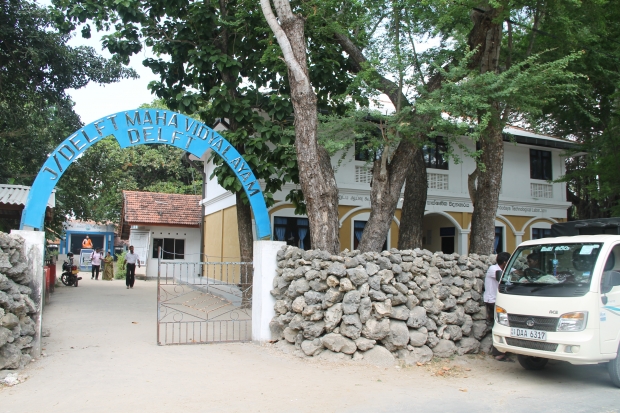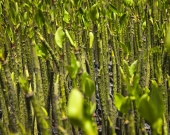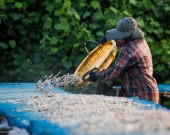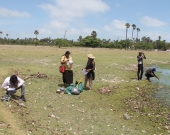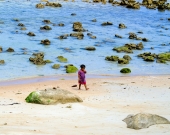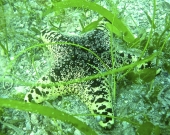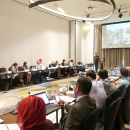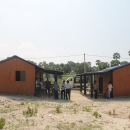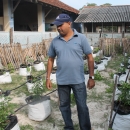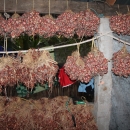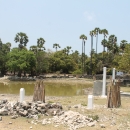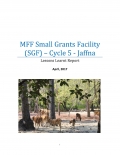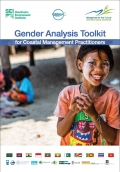MFF supports local community action in Sri Lanka for the sustainable use of coastal ecosystems. Enhancing community participation in coastal area management, including increasing the resilience of coastal and riverine communities to climate change and sustainable lievelihoods development are key MFF activities in the country.
MFF’s priorities address critical issues facing the environmental sustainability of coastal ecosystems in Sri Lanka. Sustainable alternative livelihood options, established through local organizations, are also being introduced widely to reduce pressure on coastal resources.
The coastline of Sri Lanka is approximately 1,340 km long and hosts a number of interrelated coastal ecosystems, including bays, beaches, dunes, estuaries, lagoons and tidal flats. Found within in these are a range of habitats such as mangroves, coral reefs. These coastal areas support a range of nationally important economic activities including tourism, fisheries and port developments.
Sri Lanka’s coastal areas are under threat from population increase, coupled with poorly planned coastal development, more intensive and industrialized resource extraction, and industrial pollution, shrimp farming, unregulated illegal sand mining, and climate change. Most of these issues are underpinned by the broader problems related to governance. Other issues, such as mangrove planting in estuaries and lagoons, are also cause for concern, particularly in reagrds to appropriate conservation and development activities.
Sri Lanka has a strong foundation in and capacity for coastal management. It has a coastal zone management programme that has been in operation for three decades, three cabinet approved Coastal Zone Management Plans (CZMPs), a dedicated line agency, the Coast Conservation and Coastal Resources Managemet Department and a large contingent of well trained technical experts and coastal managers.
Climate change-impacts and adaptation
Sri Lanka’s coasts will be exposed to the same increase in risks due to climate change and sea-level rise many other countries will experience, for example: coastal erosion, coral bleaching, increased risk of flooding and problems with freshwater supply. The Sri Lanka National Strategy Action Plan (NSAP) recognises that planning in coastal areas needs to consider these projections particularly since the changes will occur gradually. The Stern Report on Climate Change (2006) in the analysis of the economic implications of global change recommends that adaptation measures need to be included in planning now in order to avoid unbearable cost burdens in the face of a crisis entrained by postponement of action.
The MFF Sri Lanka NSAP provides an opportunity to begin addressing adaptation to global warming and climate change considerations have been carefully mainstreamed where relevant throughout the specific priority activities developed for Sri Lanka. The NSAP also reflects climate change priorities in its 14 Policies, which represent the principles by which the implementation of the NSAP should abide.
MFF’s programme of work in Sri Lanka
MFF’s programme of work in Sri Lanka is overseen by a National Coordination Body (NCB) Sri Lanka, which is comprised of representatives from a range of governmental departments, NGOs, inter-governmental organisations and academic institutions. A National Strategy and Action Plan (NSAP) and its associated workplan, guides the work of the NCB.
Geographic focus and Strategy
The NSAP prioritises activities that may be relevant only in specific areas of the country. For example, Special Area Management (SAM) sites that have been deemed nationally significant by the Government.
Additionally, post-conflict areas, e.g., the eastern and northern coastal areas are considered to be critical areas requiring attention through the MFF. All efforts will be made to work in these areas, however, implementation may be problematic and slower in these areas.
Sri Lanka’s NSAP has been developed specifically to integrate successive national Coastal Zone Management Plans (CZMPs) developed by the government’s Coastal Conservation and Coastal Resources Management Department as well as to strengthen the application of the ecosystem approach in the work of the CZMP. MFF’s country strategy for Sri Lanka is dictated in the NSAP’s Strategic Action Plan (SAP) which represents a framework of priority activities that will be supported through MFF in Sri Lanka under all the 15 Programmes of Work (PoWs) stipulated under the overall MFF Action Plan.
Alignment to ongoing in-country initiatives and priorities
The NSAP has been developed to complement and align itself to more general ongoing initiatives, plans and policies (e.g. ecosystem-based planning and management for wetlands, including coastal wetland systems, by the Central Environmental Authority of the Ministry of Environment).
The Sri Lanka NSAP is strongly aligned with the National Coastal Zone Plan and aims to influence the next revision of this plan through advocating an integrated ecosystem approach. Steps to support this revision have already been initiated.
MFF Sri Lanka’s priorities include:
- Buidling knowlege: improving communication, awareness and education;
- Strengthening empowerment of coastal communities;
- Supporting the development of Sustainable Funding Mechanisms in context of proposed environmental levy;
- Priority actions on improving governance (e.g., activities regarding the role of media and civil society);
- encouraging sustainable business practices.
 Sri Lanka
Sri Lanka 